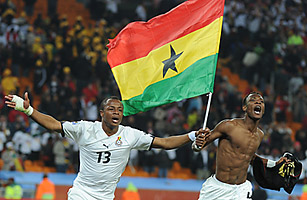
Ghana's defender John Paintsil, right, and Ghana's midfielder Andre Ayew celebarte with national flag after their Group D first round 2010 World Cup football match on June 23, 2010.
Walking underneath the elevated subway tracks on Jerome Avenue in the Bronx, N.Y., Eliasu Abubakari, one of the thousands of Ghanaian immigrants living in New York City, is waving his arms around, trying to explain his soccer loyalties. "I don't know who to support," he says. Abubakari, like many of his fellow Ghanaian-Americans, is a bit torn about Saturday's second round World Cup game between the United States and Ghana. "I mean, I love both countries, for real. I can't lose. If the Americans win, I don't lose. If Ghana wins, that's cool too. I'm down with that."
Within the U.S., Saturday's match will bring unprecedented attention to Ghana, a small coastal nation of 22 million in West Africa. Americans are watching the World Cup in record numbers, and the team's perseverance and late-game heroics have clearly captured the imagination of the nation. Ghana is the lone African nation to advance to the second round at Africa's first-ever World Cup, and could seriously crush America's soccer dreams. The Black Stars, as the team is known, are fast, skilled, and have already scarred the U.S. soccer psyche. Ghana beat America 2-1 at the last World Cup, in Germany, and the win knocked the U.S. out of the tournament.
This time around, Ghana advanced to the knockout round despite the absence of Michael Essien, its star player, who is sitting out this World Cup with a knee injury. The country is pretty resilient off the pitch too. In 1957, Ghana became the first black African country to gain independence from British colonial rule. The country is rich in natural resources. "We have cocoa," says Doris Boadu, 47, a Ghanaian immigrant whose family owns a beauty supply store in the Bronx. "We have goat, we have diamonds, we have timber." Add bauxite and gold to that list.
Ghana has one of the more stable government structures in Africa, and its $732 GPD per capita ranks 31st out of the 53 African countries, according to the McKinsey Global Institute. A new McKinsey report, entitled "Lions On The Move: The Progress and Potential of African Economies," places Ghana in a third tier of African nations, called "transition economies." These countries, which also include Kenya, Senegal and Cameroon, fall a notch below "Africa's growth engines," like Egypt, Morocco and South Africa, and "oil exporters" like Algeria and Nigeria," yet a step above the poorer "pre-transition" African nations like Ethiopia, Mali and Sierra Leone. "Ghana and Uganda, for instance," the authors write, "will benefit from recent oil finds, generating additional revenue that — if invested wisely — could spur further diversification."
Despite this relatively bullish outlook on the country, many Ghanaians aggressively seek opportunities abroad. There are some 100,000 immigrants from Ghana living in the United States. Many Ghanaian-Americans have settled in a "Little Ghana" neighborhood just north of Yankee Stadium in the Bronx. Along 174th Street near the Cross Bronx Expressway, for example, a West African grocery store and barbershop form the core of the Bronx Little Ghana. In between those two shops is a store that sells Ghanaian movies, like Who Loves Me? starring Jackie Appiah, who won best actress honors at this year's African Movie Academy Awards. "She's an Angelina Jolie type of chick," explains Lacquette Taylor, 23, one of the store's workers. "She's all over the place."
Little Ghana is gearing up for Saturday's big game against the States. "This is a crucial moment for our country," says Jibrilla Mumuni, 22, who moved to New York City from Ghana 18 months ago. Mumuni is hanging out in Dred's Barber Shop with about a dozen other Ghanaian immigrants. "When it comes to soccer in Ghana, it's like the Fourth of July here." And while Ghanaian-Americans talk about split loyalties, at the end of the day most will be cheering on their native country. "It's going to be 3-0 Ghana," says another Ghana supporter in the barbershop. "Before the Americans can beat Ghana, they have to learn the name of the game. Soccer? It's 'football.' Because you use your feet, you know."
Not that everyone in Little Ghana will be waving the red, gold, and green flag — with a black star in the middle. "I'm rooting for the U.S., hell yeah," says Issah Razak, 23, a pharmaceutical technician who moved from Ghana to America eight years ago. "I love my home country, no doubt. But when it comes to soccer, I go for the best. And the U.S. is playing a better game right now." Razak's barbershop buddies dismiss him with a wave of the hand, but he couldn't be more confident. "You can't hate me because I'm right," he says. "You watch, five years from now, the U.S. will be a true soccer nation. You walk around and see so many kids playing the game now."
Ghana supporters will pack this shop on Saturday, to watch the game on a big-screen TV next to the chairs. "I'll be the one in the U.S. jersey," Razak says. "The only one."